Imagen Courtesy of El Tiempo, Colombia / David Maris
Archangel Pretel standing in the middle between Christian Sanon and Antonio Intriago
In the chaos after the assassination of Haiti’s president on July 7, the alleged hit squad of former Colombian soldiers was hoping to be rescued by the Miami security company that sent them on their fatal mission.
The person they turned to was Arcangel Pretel, a fellow Colombian, based in Miami, who liked to boast of his U.S. government connections and is believed to have been an FBI informant, according to several sources.
“The troops are on the way,” he told them, suggesting a U.S. government rescue was in motion, according to evidence in the possession of authorities investigating the crime.
As it would turn out that was far from the truth.
Pretel’s role remains one of the many mysteries in the assassination. He moved out of his apartment in Miami soon after the FBI executed a search warrant on July 27 and he has since disappeared without trace.
Antonio Intriago, his business partner at CTU Federal Academy, the Miami firm that hired the Colombian soldiers, feels “duped and mislead” has no idea where he is, according to his lawyers.
The families of the Colombian soldiers also want answers from Pretel. They accuse him of abandoning their relatives, three of whom died in the operation while the rest are now being held in squalid conditions at Haiti’s National Penitenciary where they complain of being tortured.
“We haven’t heard anything,” said Milena Grosso, the wife of the one of detained Colombian soldiers. “He has had no communication with us, with the families, with absolutely no one. We don’t know where he is. Absolutely nothing,” she added.
In interviews with US, Colombian and Haitian authorities, some of the Colombian contractors have pointed to Pretel as one of the main masterminds of the plot to kill Moïse, according to audio recordings of witnesses revealed by Caracol TV.
Pretel is also identified as “one of the heads” of the Colombian team and a prime suspect in the assassination, according to a detailed 122-page investigative report by the Haitian judicial police, obtained by Univision News.
Dual identity
A former military trainer, Pretel knew several of the Colombian security contractors well and had personally recruited them through CTU Federal Academy.
But they knew him by his real name, Gabriel Perez, who they met during anti-narcotics training in the 1990s in the Colombian city of Cali, back then home to one of the most notorious drug cartels. Perez served briefly in military and later created his own security firm, according to Jose Espinosa, a military veteran who is representing some of the families of the Colombian soldiers.
“He was a totally trusted friend,” said Yenni Capador, the sister of Duberney Capador, one of the Colombians recruited by Pretel for the Haiti mission. “That’s why he jumped at the [Haiti] proposal,” she added, saying the soldiers were promised $2,700 a month each.
Pretel later worked as confidential informant for the FBI in a 2015 New York federal drug indictment involving two left wing Colombian guerilla groups, the FARC and the ELN, according to a Colombian law firm that advocated on behalf of one of the defendants was extradited to the United States.
CTU Federal Academy
Pretel showed up at Intriago’s company, Counter Terrorist Unit Security (CTU Security) in South Florida some time in 2018 as a customer. He professed to have strong connections with law enforcement, according to Intriago’s attorneys, Gilbert Lacayo and Joseph Tesmond. He also talked about his experience in Colombia working with the U.S. military on ‘Plan Colombia’, a decade-long mission to wipe out the country’s notorious drug cartels.
In October 2019, Intriago and Pretel went into business together, forming a new company, CTU Federal Academy, which they jointly managed according to Florida state corporation records. It listed its principal address as the same as Intriago’s company, CTU. Intriago gave him a desk and office space.
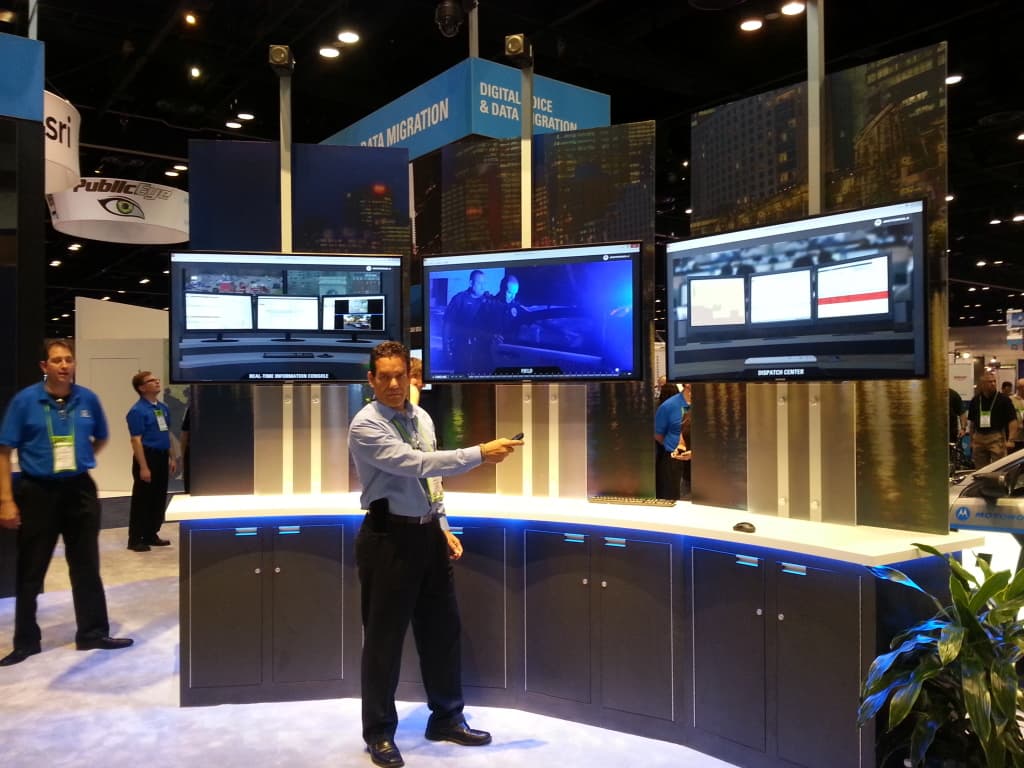

Imagen CTU Security website
Antonio ‘Tony’ Intriago, is president of CTU Security, the firm in South Florida that hired the Colombian ex-soldiers in Haiti. “We represent manufacturers of security and protection products and wholesalers of many different brands of high quality bulletproof vests and many other protective equipment,” thr company says on his website.
Pretel allegedly claimed to have worked for the FBI and invited agents to visit the office of CTU “on a number of occasions and the agents were made aware of the actions of CTU and the upcoming [Haiti] business plan,” the lawyers say.
But he never revealed his true identity. “Our client … was duped and mislead by a number of people. We are still investigating as to who did what and when,” Intriago’s lawyers told Univision. “All we know is that some people who were introduced to our client weren’t who they said they were,” they added.
The Haiti contract
In 2020, the company was approached to provide security for a redevelopment project led by a Haitian-American pastor, Christian Sanon, with the backing of wealthy investors. The contract promised lucrative rewards down the road when a new, more business-friendly government took power after elections scheduled for later in 2021. CTU Federal Academy secured a loan of $172,000 for the operation, including transportation and lodging for the Colombians in Haiti.
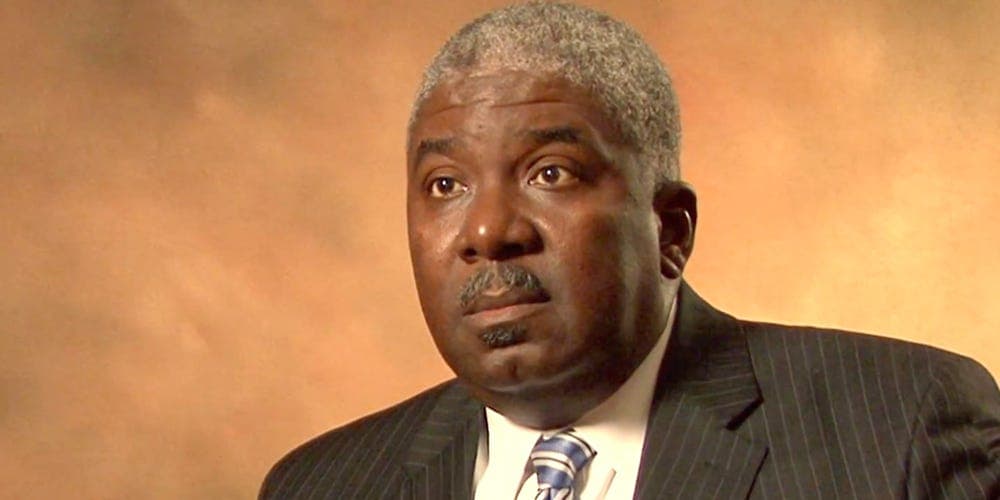

Imagen You Tube
Screenshot of a video of Christian Sanon posted on his YouTube channel.
Using his connections, Pretel recruited the security team by reaching out to former Colombian soldiers.
Pretel never apparently visited Haiti, possibly due to travel restrictions related to the special immigration status sometimes afforded to foreign informants for U.S. law enforcement agencies, according to source familiar with the case. He may also have been in the Witness Protection Program, a highly secretive system designed to provide high risk informants with new identities in the United States for the rest of their lives.
The FBI declined to comment about its relationship with Pretel.
Bolivia trip
Pretel did organize a business trip for CTU Federal Academy in October last year to Bolivia, according to the caracol jail interviews. The trip, which occured shortly before hotly contested elections, also involved security contracts, using Pretel contacts with officials at the Ministry of Defense.
But it came to nothing after the government was defeated in the elections on October 18. Several top officials of the outgoing government, including the Defense Minister, either fled Bolivia or were arrested on corruption charges and their alleged role in a coup plot.
Almost no public photographs of Pretel exist, except for one in which he was photographed next to a private jet at Fort Lauderdale executive airport alongside Sanon and Intriago, before one of two trips his business partner made to Haiti.
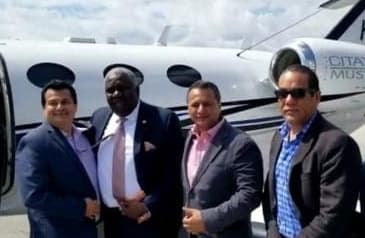

Imagen Courtesy of the Investigative Unit of El Tiempo newspaper, Bogota.
This photo is believed to have been taken on 22 June as Pastor Christian Sanon prepared to board a private plane to fly to Haiti with his partner Antonio Intriago of CTU Security. From left to right, Walter Vientemilla, Worldwide Capital, Christian Sanon, Arcangel Pretel, Antonio Intriago and another unknown man.
At first the plan was simply for the Colombian team to provide security for the group of investors, led by an evangelical Haitian-American pastor – and would-be presidential candidate – Christian Sanon.
‘Orders of Day’ issued by CTU Federal Academy seen by Univision show the soldiers being assigned guard duty.
Intriago’s lawyers say their client believed the security contract was fully legitimate and above board. Intriago made no secret of it, writing a letter to the U.S. embassy to explain his presence in Haiti. During one visit to Haiti in late May, he tried to visit the U.S. embassy to brief officials, according to a source familiar with the visit. He was turned away as he had not made a prior appointment.
The State Department declined to comment.
But the plan quickly fell apart over money. Sanon had installed himself in a fancy hotel, but bills weren’t being paid. The Colombians complained they weren’t getting fed properly. Some were sleeping on the floor, without mattresses, until Pretel sent $300 to Capador to buy some.
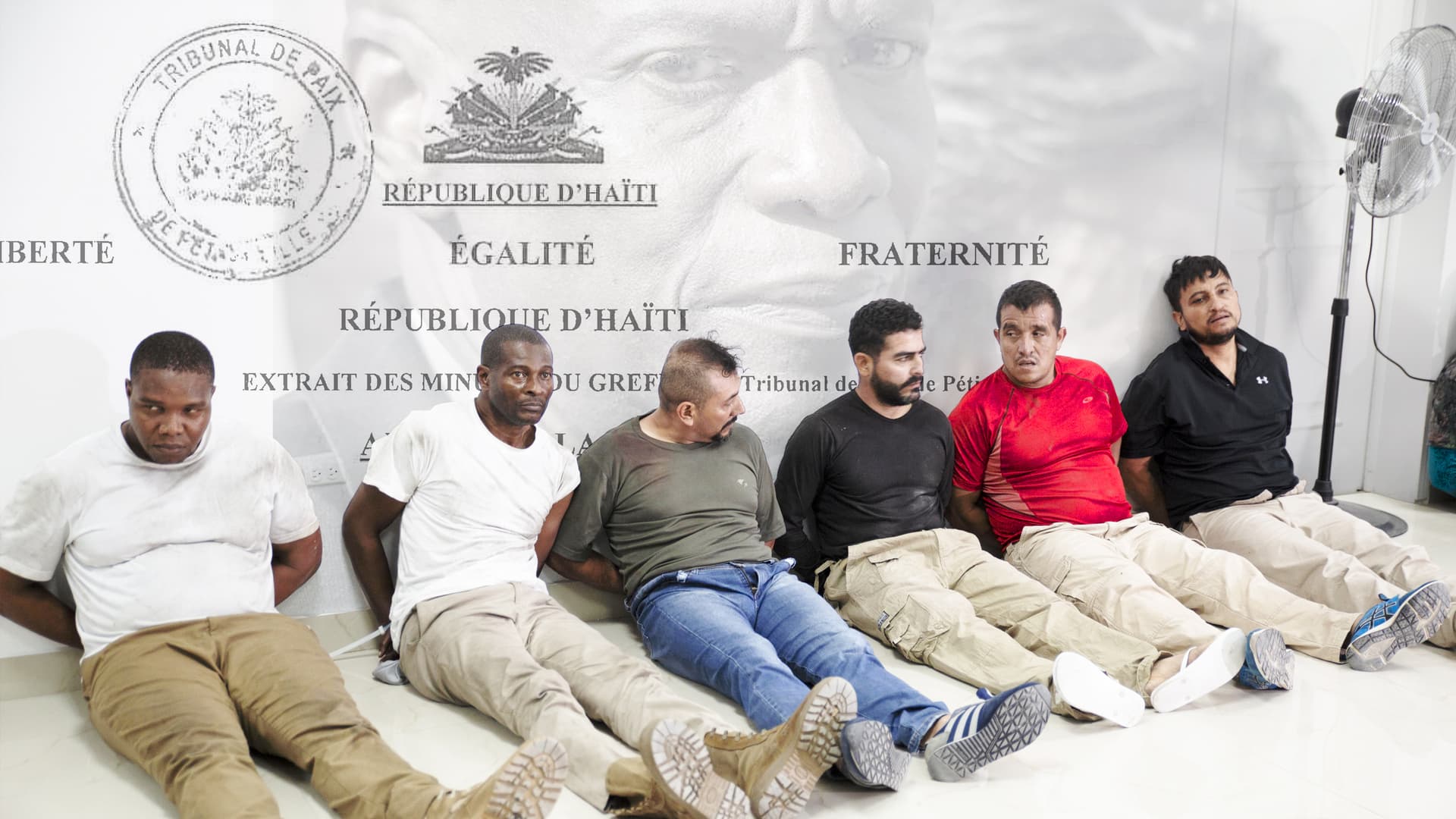

Change of plan
Suddenly, and inexplicably, the plan changed. Pretel issued new orders, according to audio tapes of interviews with some of the jailed Colombians by agents investigating the assassination, which were revealed exclusively by Caracol TV in Colombia last month.
They were now going to go to the president’s house armed with an arrest warrant. “Gabriel tells me that we are going to support the Haitian authorities with the arrest,” said Capt. German Rivera, one of the Colombians captured who met Pretel in Cali in the 1990s.
In reality, the plan was to kill the president. The order allegedly came from Pretel and a well-connected former Haitian justice ministry official, Joseph Felix Badio, according to the Caracol jail tapes.
Most of the Colombians fell in line, believing the mission was sanctioned by the U.S. government. Pretel would send selfies to Rivera via whatsapp, showing him entering U.S. government buildings for high level meetings, according to Rivera.
Two of the Colombians abandoned the mission at the end of June after learning that the real intention was an assassination, according to the Caracol tapes.
“There’s a lot here that doesn’t ring true. The FBI doesn’t do this sort of thing,” said Mike Vigil, former DEA head of international operations, referring to a possible U.S. government link to the assassination. U.S. government agencies have a duty to inform if they know someone’s life is in danger, especially the president of another country, he explained.
Besides Moise was considered a U.S. ally.
However, sometimes informants engage in actions behind the U.S. back. “Every agency has informants who play both sides of the fence and they do things DEA and FBI don’t approve of. We sometimes dance with the devil but we can’t get the information we need without these guys,” added Vigil.
Pretel was not the only U.S. government informant linked to the assassination of Moise. “Either Mr Pretel went rogue or some heads are going to roll at the FBI and DEA,” said Regina de Moraes, a criminal immigration attorney who represents DEA informant, Joseph Vincent, a Haitian-American jailed in Haiti as a suspect in the assassination.
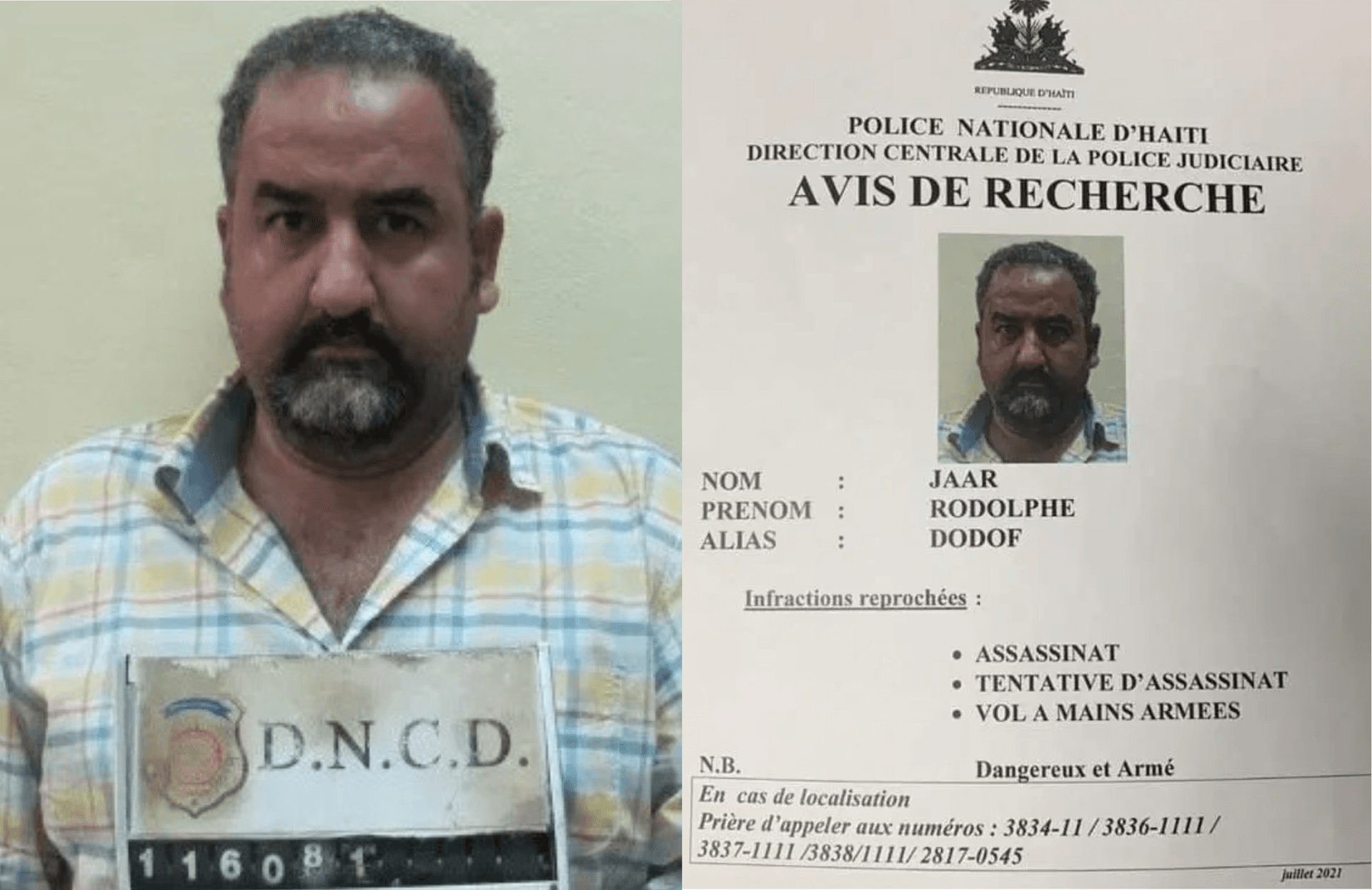

The assassination
Shortly after 1.30am on the morning of July 7, a team of six Colombian former soldiers stormed the residence of president Jovenel Moise, according to the Caracol tapes and the Haitian judicial police report. They met virtually no resistance. Badio is accused by several witnesses of having bribed members of the Presidential Guard with $80,000 to facilitate the mission, according to the Haitian police report.
The Colombians allegedly entered Moise’s bedroom and shot him 12 times, killing him instantly and also wounding his wife.
At least 44 people, including 18 Colombian former soldiers and several Haitian police were arrested after the murder. The motive for his killing is still unclear, and mystery also surrounds who the intellectual authors were. Agents from the FBI and the Department of Homeland Security (DHS) are helping in the investigation.
Haitian authorities issued an arrest warrant for Badio, but he has also vanished.
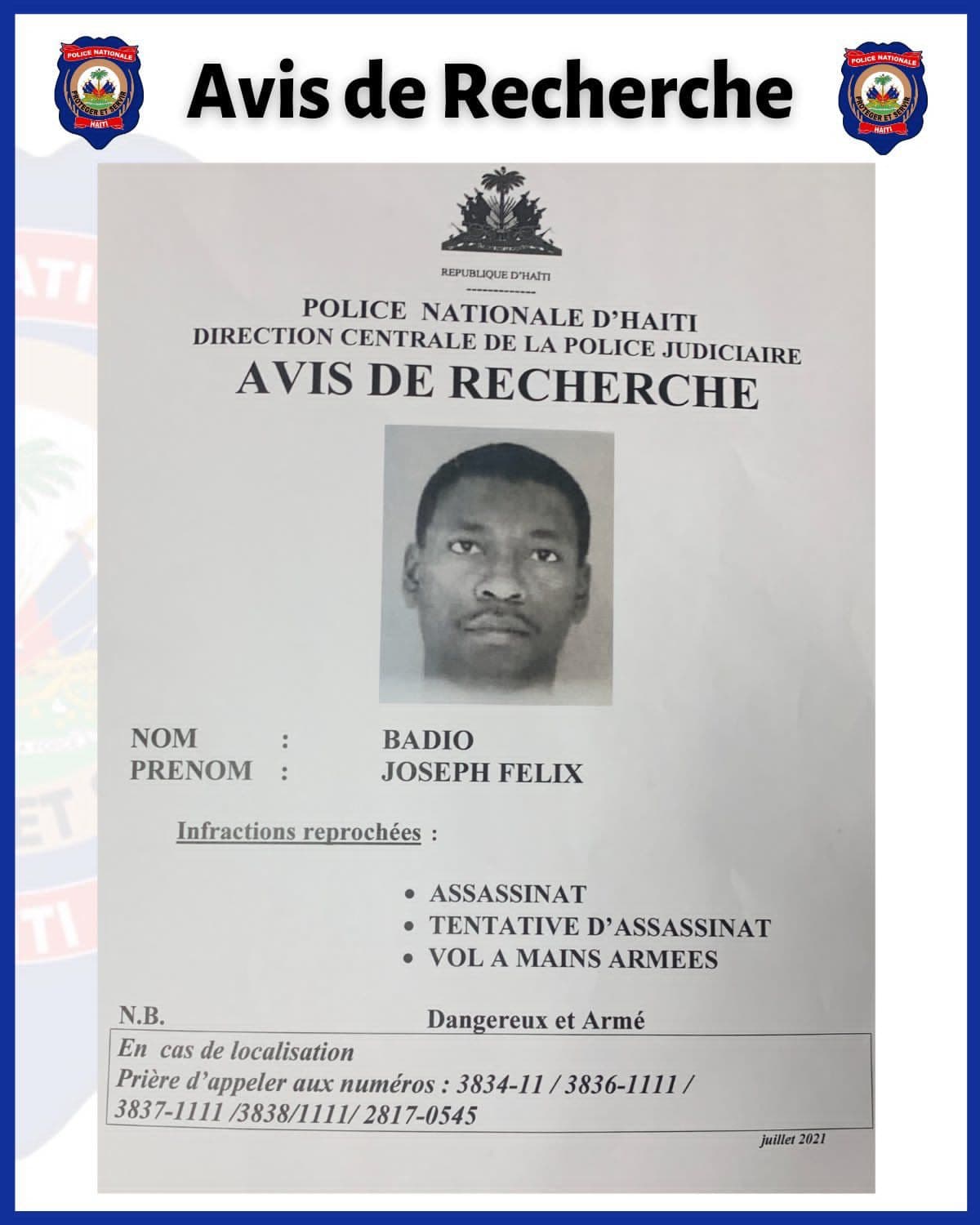

Imagen Haitian National Police.
A police wanted poster for Joseph Felix Badio, a former Justice Ministry official who is one of the chief suspects in the assassination of President Jovenel Moise.
Badio is suspected of conspiring with other Haitian politicians. The suspicion has even fallen on the prime minister, Ariel Henry, due to two phone calls he took from Badio, lasting a total of seven minutes, placed barely three hours after the assassination from the vicinity of the crime scene. Henry has not explained what was said in those calls.
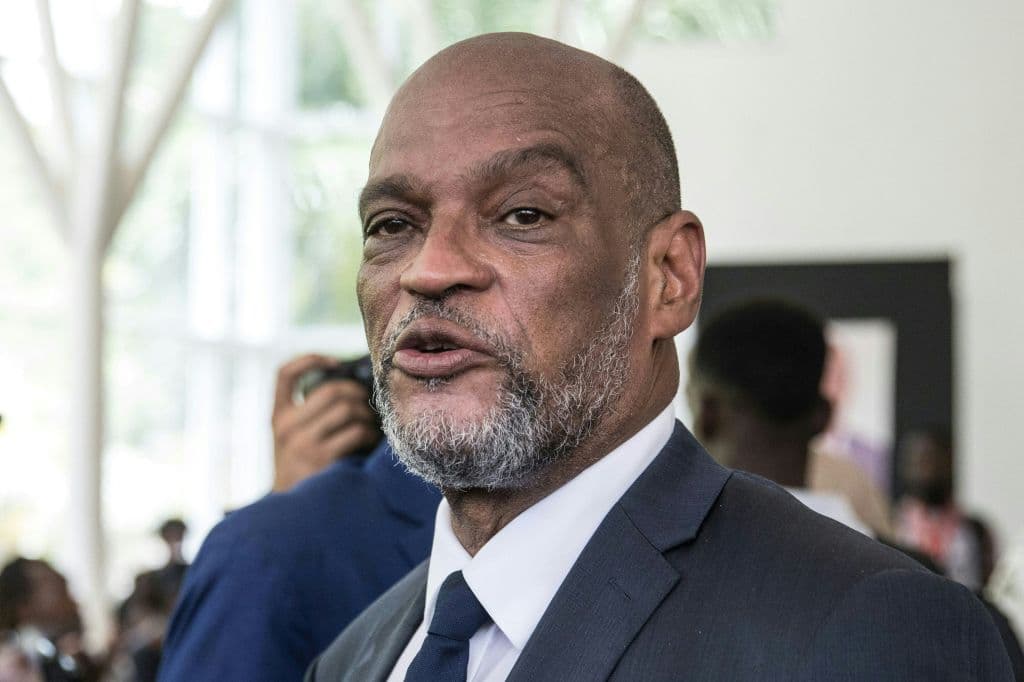

After the assassination Pretel never severed his communications with the Colombians. Instead, he appears to have tried to assist their getaway.
The supposed rescue
After allegedly killing the president, they allegedly fled in rented cars, carrying boxes of money they had found in the residence. Supposedly, the plan was for the soldiers to head to the presidential palace where a new president would be sworn in, according to the jail tapes.
But their escape route was blocked by police reinforcements who had rushed to the scene in a belated effort to save the president.
“Gabriel (alias Arcangel) was telling me that they were already going to clear the road because the police had two pickups blocking the road and behind the vans were armored cars,” said Rivera.
The Colombians were forced to take to foot, before hiding in a house, where they say they waited for instructions from Pretel.
Communicating via whatsapp, Pretel tried to reassure the security team that a rescue was being organized with the help of the U.S. government.
“He told us later that the U.S. embassy was mobilizing, that they were going to bring, I don’t know how many U.S. soldiers, to get us out,” one of the former soldiers, Jheyner Carmona, told investigators.
Those messages, now in the hands of investigators, appear to show Pretel coordinating their movements, according to persons familiar with the chat. “He’s running the show. He’s the maestro who’s supposedly going to save these guys,” according to one source who has reviewed the messages.
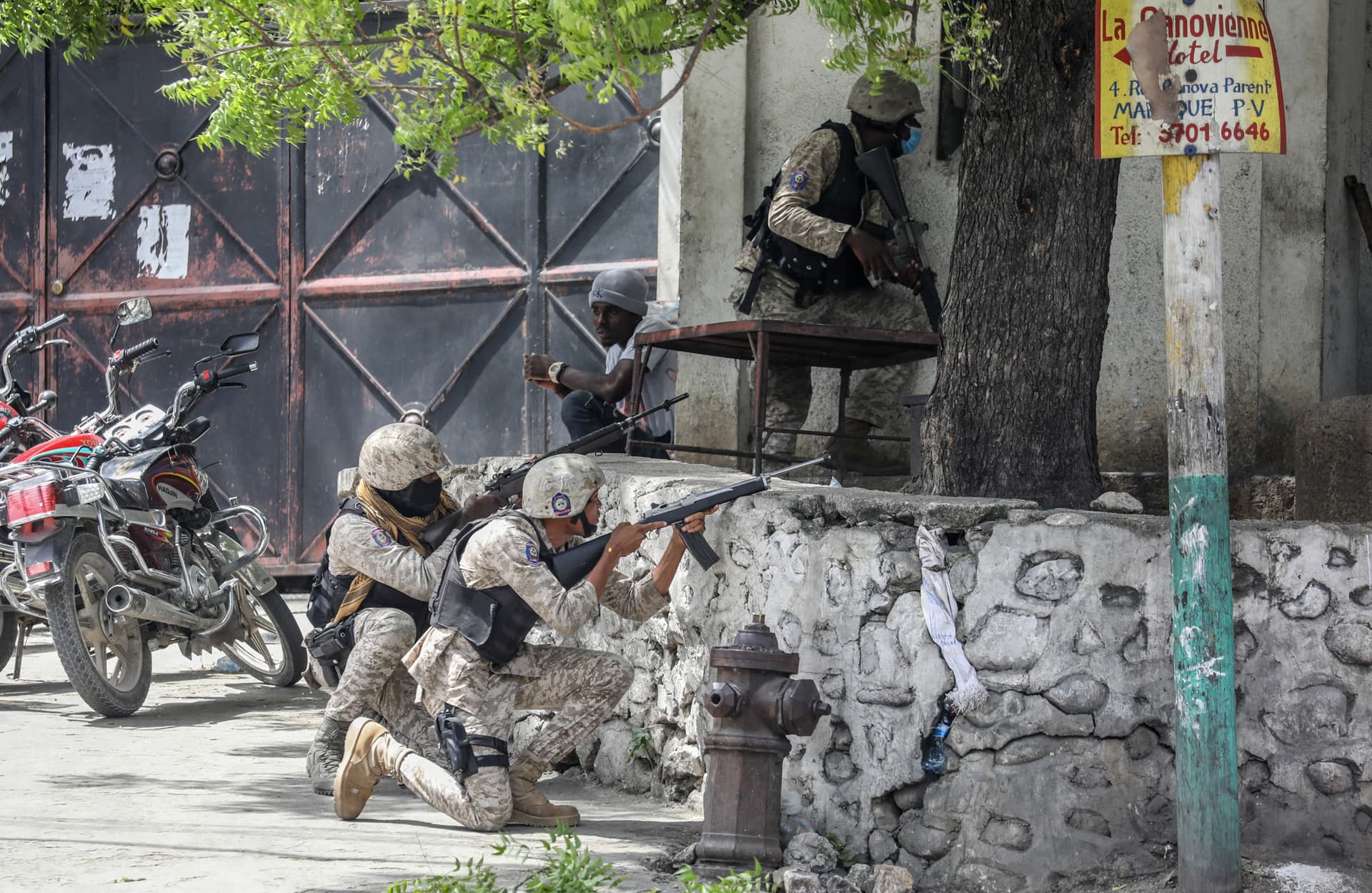

Imagen VALERIE BAERISWYL/AFP via Getty Images
Haitian police hunting for assassins of President Jovenel Moise, July 7, 2021.
For the next 36 hours the Colombians hid, waiting to be rescued. Later that day the Colombians came under heavy fire from Haitian police, using tear gas and grenades. Capador and two others were killed.
The rest of the group, led by Rivera, were guided by Pretel to the Taiwanese embassy nearby, which was empty. They spent the night there in constant communication waiting for word from Pretel on their next move.
But the help never came. The next morning, the police raided the house and the Colombians, by now almost out of ammunition, surrendered.
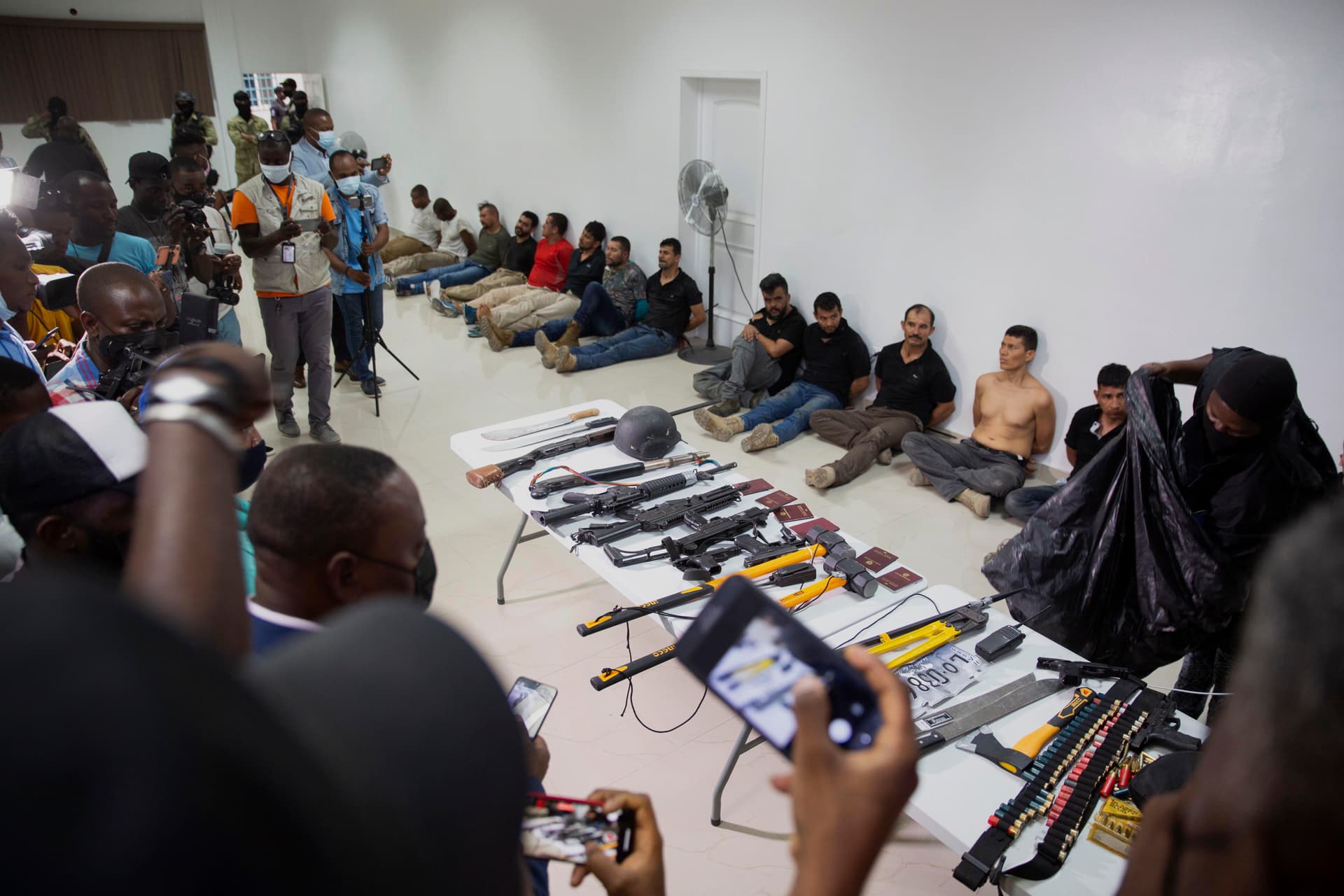

Imagen Joseph Odelyn/AP
Suspects in the assassination of Haiti’s President Jovenel Moise are shown to the media, along with the weapons and equipment they allegedly used in the attack, at the General Direction of the police in Port-au-Prince, Haiti, Thursday, July 8, 2021.
Vanishing act
Pretel’s name surfaced soon after the assassination as a possible suspect. But no arrest warrant was issued for him in Haiti or Colombia.
Intriago immediately offered his full cooperation to FBI agents investigating the case, handing over his phone records and computer.
Two weeks after the assassination, the FBI executed search warrants at addresses for Intriago and Pretel, and one other man, the investor who lent money to CTU Federal Academy.
Soon after Pretel moved out of his modest two-bedroom apartment just west of Miami airport.
A public records data search by Univision turned up no trace of him, including property or phone records. Univision was able to contact his former landlord who confirmed he had recently moved out of the apartment.
The landlord was unaware of his involvement in Haiti. When he moved in Pretel told the landlord he had previously worked for the U.S. military.
Back in Colombia, the relatives of the detained soldiers want to know why Pretel lured their loved ones into such a shady scheme.
“I would like to ask him what his intentions really were,” said Yenni Capador. “He should show his face and tell the world what really happened that day. He should explain to each one of us what happened,” she added.
Source link : http://www.bing.com/news/apiclick.aspx?ref=FexRss&aid=&tid=66b515354fc74db59cf3d32f97815144&url=https%3A%2F%2Fwww.televisa.com%2Funivision-news%2Flatin-america%2Fwho-is-the-mysterious-arcangel-pretel-and-why-did-he-disappear-after-assassination-in-haiti&c=17184547670761607277&mkt=en-us
Author :
Publish date : 2024-08-08 06:00:00
Copyright for syndicated content belongs to the linked Source.












